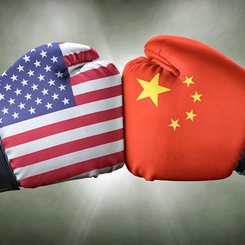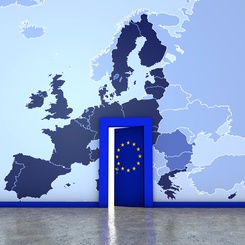In this EK Live Series, professor of economics Estefania Santacreu-Vasut discusses the importance of globalization. In doing so, she sheds some light on the economic concept of the nature of goods and its importance in what seems to be the age of anti-globalization.
Danielle Steele: In January 2019, the World Economic Forum hosted its annual meeting in Davos. According to the WEF, we are in a time of unprecedented uncertainty, fragility and controversy, and we are fast approaching a new phase of global corporation. As such, the theme of the conference was “Globalization 4.0, shaping a global architecture in the age of the fourth Industrial Revolution”. Today, and just about everything we see in the news, the questions of globalization are at the forefront of the conversation. Could you tell us more about how basic economic theories support globalization?
Professor Santacreu-Vasut: When we think of globalization, we think of flows of goods, we think of trade, flows of people, migration, flows of capital or investment, and most importantly, we think of flows of ideas or knowledge. If we look at how globalization works, we realize that institutions play a big part. In my research, I have extensively studied how institutions may help or obstruct these knowledge flows. Exploring the nature of goods, exploring ideas and migration flows are topics that I am discussing in a recent book that I have co-written with Tom Gamble, who is a novelist.
Danielle Steele: Why do you think the WEF chose this theme and why is it so important now?
Professor Santacreu-Vasut: The World Economic Forum recognizes that we are in a transformative phase of globalization, and it also recognizes that despite the opportunities brought about by technology, there is a recent backlash against openness. We see it in the emerging idea of closing the borders. In that sense, the World Economic Forum decided to tackle the economic factors as well as the narratives behind globalization or anti-globalization, taking into account the multi-dimensional aspects of globalization.
Danielle Steele: And, if we don’t succeed in the globalization effort, what are some of the negative effects of anti-globalization, that one may not anticipate?
Professor Santacreu-Vasut: So, in our book, The Nature of Goods and the Goods of Nature, we have tried to give the reader access to the widest possible picture of the impact globalization has. We argue that there is often a lack of long-term perspective. Closing the borders may seem a good idea at first, but truth is, it may be very detrimental in the long run. History and economics history research show that countries that have closed their borders have subsequently had to face the worst economic outcomes for future generations. It is very simple: if you trust people less today, you are going to exchange less with others in the future and trust has been shown by the economists to be a very important factor. Therefore, if we go back to our example, closing the borders is detrimental both for current generations, but for future generations as well. The dynamics of cultural openness or closing down is very important for economic exchange, and in our book, we emphasize the importance of culture, institutions, but also of values on how we succeed or fail as an economy.
Danielle Steele: If we look at Brexit as an example, can you pinpoint some of the negative consequences of anti-globalization?
Professor Santacreu-Vasut: What we can see is that there is an issue of knowledge flows, and there is also a lack of awareness. When people voted Brexit, they didn’t really know what the deal was going to be about and now, there is an ongoing discussion on whether they should vote again. So, it shows that the ties that nations are able to create are deep; they are hard to break.
Danielle Steele: I have another question for you: How has the rise of identity politics happen so quickly?
Professor Santacreu-Vasut: I think the financial crisis in 2008-2009 accelerated the rise of identity politics. In a period of recession, politicians have difficulties making promises they know they won’t be able to keep; playing on and with identity issues is the easy way to gain voter support, “identity” being a very diffuse concept. Therefore, I think the financial crisis and the economic downturn may in part explain the rise of identity politics.
Danielle Steele: Besides the goods of nature and the nature of goods, are there other economic concepts that support globalization?
Professor Santacreu-Vasut: What we are today, what we eat and what we do today is the testimony of the exchanges between our ancestors. Sometimes, what we believe is our identity is the testimony of our ancestors - trade, flows of ideas, flows of people and goods.









